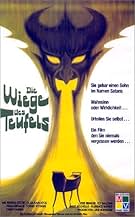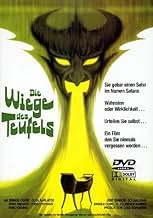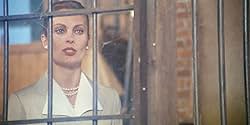A blind boy, who lives alone with his mean sister in a rundown hotel in Venice, receives a vision that warns him of the upcoming birth of the Antichrist. Soon, his sister mysteriously become... Read allA blind boy, who lives alone with his mean sister in a rundown hotel in Venice, receives a vision that warns him of the upcoming birth of the Antichrist. Soon, his sister mysteriously becomes pregnant.A blind boy, who lives alone with his mean sister in a rundown hotel in Venice, receives a vision that warns him of the upcoming birth of the Antichrist. Soon, his sister mysteriously becomes pregnant.
Featured reviews
Directed by Ugo Liberatore (who co-scripted Giorgio Ferroni's fantastic 1960 Gothic Horror film "Il Mulino Delle Donne Di Pietro" aka "The Mill of the Stone Women"), "Nero Veneziano" of 1978 is an elegant, creepy and bizarre occult flick which is sometimes unfairly called a 'rip off' of American films like "Rosemary's Baby" and "The Omen". This only makes sense if any film that has to do with the Antichrist released after the aforementioned films is automatically a rip-off (in which case one would also have to argue that all American Slashers are rip-offs of Italian Gialli like Bava's "Bay of Blood"). "Nero Veneziano", in my opinion, is not a rip-off. Also, some people seem to regard this film as a Giallo, which astonishes me since it simply isn't at all: There is no murder series or murder mystery here, but occult and supernatural Horror - Which makes it anything but a Giallo. While it is a worthwhile and elegant film it isn't a masterpiece either, as whereas the visual style is wonderful and the film's bizarre nature is fascinating, the flick also isn't too coherent, and it occasionally becomes a little lengthy in-between. Still, it is a compelling experience which my fellow fans of Italian Horror should not miss.
"Nero Veneziano" is terrifically set in Venice, which contributes a lot to the film's visual beauty. Mark (Renato Cestiè), a boy who has been blind for the last three years, is tormented by occasional gruesome and infernal visions. When the orphaned boy and his older sister Christine (Rena Niehaus) also loose their grandmother in a tragic event, Mark's disturbing visions turn out to be more than bizarre nightmares...
The film is visually beautiful and impressive, though the whole thing is bleak and the colors are kept very cold. Actually, the visual style somewhat reminded me of Pupi Avati's brilliant "La Casa Delle Finesetre Che Ridono" ("The House with the Laughing Windows"), though Avati's film is set in the countryside, and furthermore a masterpiece, which this film isn't in my opinion. Still the story is fascinating, though it has its holes. The film is rather slow-going, but includes a bunch of truly disturbing outbursts, such as Mark's violent visions. Leading actor Renato Cestiè, who was 15 when this film was made, is best known for playing child roles in older genre gems, such as Mario Bava's "Reazione a Catena" ("A Bay of Blood", 1971) and Sergio Martino's "I Corpi Presentano Tracce Di Violenzia Carnale" ("Torso", 1973). Rena Niehaus, who plays the female lead, might also be known to fans of Italian Exploitation/Cult cinema for starring in Epinardo Visconti's "La Orca" (1976) and the sequel "Oedipus Orca" (1977). Overall, this is a creepy and atmospheric occult horror film that is especially recommendable due to its elegant visual style and bizarre mood. Recommended.
"Nero Veneziano" is terrifically set in Venice, which contributes a lot to the film's visual beauty. Mark (Renato Cestiè), a boy who has been blind for the last three years, is tormented by occasional gruesome and infernal visions. When the orphaned boy and his older sister Christine (Rena Niehaus) also loose their grandmother in a tragic event, Mark's disturbing visions turn out to be more than bizarre nightmares...
The film is visually beautiful and impressive, though the whole thing is bleak and the colors are kept very cold. Actually, the visual style somewhat reminded me of Pupi Avati's brilliant "La Casa Delle Finesetre Che Ridono" ("The House with the Laughing Windows"), though Avati's film is set in the countryside, and furthermore a masterpiece, which this film isn't in my opinion. Still the story is fascinating, though it has its holes. The film is rather slow-going, but includes a bunch of truly disturbing outbursts, such as Mark's violent visions. Leading actor Renato Cestiè, who was 15 when this film was made, is best known for playing child roles in older genre gems, such as Mario Bava's "Reazione a Catena" ("A Bay of Blood", 1971) and Sergio Martino's "I Corpi Presentano Tracce Di Violenzia Carnale" ("Torso", 1973). Rena Niehaus, who plays the female lead, might also be known to fans of Italian Exploitation/Cult cinema for starring in Epinardo Visconti's "La Orca" (1976) and the sequel "Oedipus Orca" (1977). Overall, this is a creepy and atmospheric occult horror film that is especially recommendable due to its elegant visual style and bizarre mood. Recommended.
Nero veneziano is a bleak, unsettling descent into metaphysical horror, cloaked in the rotting beauty of Venice. The film's strongest asset is its heavy, almost oppressive atmosphere, which seeps into every frame like rising damp. The cinematography captures this decay with lingering shots of crumbling architecture, dim candlelit interiors, and the cold stillness of the canals, evoking a dreamlike but suffocating sense of dread. Cinematographer Vittorio Storaro's signature use of chiaroscuro and tinted color palettes (though less flamboyant here than in his later works) helps to ground the film in both realism and symbolic unease. That said, the narrative pacing often struggles under the weight of its imagery; the film indulges in visual mood at the expense of narrative momentum.
Among the cast, Rena Niehaus delivers a quietly gripping performance, her expressive face managing to convey vulnerability and unease without relying on melodrama. Ely Galleani, in a more ephemeral role, radiates a hypnotic presence that fits the film's tone even if her character feels underwritten. Luciano Virgilio, playing the lead, captures the physical and psychological decline demanded of him, but at times his delivery flattens under the script's cryptic weight. The erotic elements, including full nudity from both Niehaus and Galleani, are photographed in a subdued, non-gratuitous manner, blending seamlessly into the film's themes of mortality, vision, and corrupted innocence. However, the film's art-house ambitions often clash with its pulpy occult trappings, creating an awkward tonal imbalance that keeps it from fully succeeding in either realm.
A blind teenage boy is sent to Venice to recover from illness, only to become the focal point of a prophetic nightmare as visions of death and plague begin to merge with reality. His parents, both uneasy and secretive, struggle to understand the dark forces closing in, while the ancient city itself becomes a labyrinth of omens, shadows, and half-truths.
Among the cast, Rena Niehaus delivers a quietly gripping performance, her expressive face managing to convey vulnerability and unease without relying on melodrama. Ely Galleani, in a more ephemeral role, radiates a hypnotic presence that fits the film's tone even if her character feels underwritten. Luciano Virgilio, playing the lead, captures the physical and psychological decline demanded of him, but at times his delivery flattens under the script's cryptic weight. The erotic elements, including full nudity from both Niehaus and Galleani, are photographed in a subdued, non-gratuitous manner, blending seamlessly into the film's themes of mortality, vision, and corrupted innocence. However, the film's art-house ambitions often clash with its pulpy occult trappings, creating an awkward tonal imbalance that keeps it from fully succeeding in either realm.
A blind teenage boy is sent to Venice to recover from illness, only to become the focal point of a prophetic nightmare as visions of death and plague begin to merge with reality. His parents, both uneasy and secretive, struggle to understand the dark forces closing in, while the ancient city itself becomes a labyrinth of omens, shadows, and half-truths.
Other than for the Venice scenarios, this late Rosemary's baby clone is almost dismissable without any comment, with its story of a blind young man trying to battle against the evil spawn of his sister short relation (in fact, she was virgin, as Satan want to mock Jesus life and death for his son)with a dark stranger, probably Satan himself. Bad acting, bad story, bad special effects, gratuitous nudity. A real B-movie, but not as good as it should be
I have to admit, I LOVE these Italian "rip-offs" of "The Exorcist"/"The Omen"/"Rosemary's Baby" that were big in the 1970's, even the bad ones. But this one is actually pretty good. I'd rank it ahead of Ovidio Assontis' "Beyond the Door", Alberto DeMartino's "The Antichrist" and Pier Carpi's "Ring of Darkness". It's difficult to compare it to "The Eerie Midnight Horror Show" or "Malabimba" because those were more straight-out sex romps. It's about on par with DeMartino's second attempt "Holocaust 2000", but it is more scary and less over-the-top silly. It was probably influenced to some extent by Nicholas Roeg's "Don't Look Now", what with its Venice setting and its young blind protagonist who keeps having apocalyptic visions. The protagonist is pooh-poohed by his sighted older sister (Rena Niehais), but she doesn't seem to find it strange when everyone around them starts dying--first their guardian, then the couple who own the pension they come to stay at (which somehow results in them inheriting the place). Then a sinister man from the boy's visions shows up at the pension and seduces the sister, impregnating her by a not-so-immaculate conception (she only gives him oral sex!). After the baby is born, the blind brother makes several attempts to kill it (the most memorable scenes in the movie), but he may be playing right into Satan's hands. . .
These Italian "rip-offs" are almost all a lot more original than they're given credit for. The low-budget Italian industry simply lacked the money to imitate big-budget Hollywood spectacles like "The Exorcist" or "The Omen" too much(and they lacked the sensibilities to imitate the subtle paranoia of a film like "Rosemary's Baby"), so they were forced to be inventive. This one has some especially effective scenes such as when the boy goes to drink out of a holy well in an effort to cure his blindness only unbeknownst to him, it is apparently full of rats and slimy black snakes!
The cast is also impressive, especially the female cast. German Playboy Playmate Neihaus turns in a surprisingly good performance (and not-so-surprisingly gets naked several times). And speaking of getting naked, the perpetually unclothed Ely Galeani and Angela Covello also show up as part of the sister's strange but very sexy babysitting coven. And Greek actress Olga Karlatos, who would later appear in several Lucio Fulci movies and as Prince's mom (!) in "Purple Rain" also appears as an especially ambiguous and mysterious character. Of course, it greatly helps everyone's performance that the English dubbing is pretty competent for a change . Good movie. Check it out
These Italian "rip-offs" are almost all a lot more original than they're given credit for. The low-budget Italian industry simply lacked the money to imitate big-budget Hollywood spectacles like "The Exorcist" or "The Omen" too much(and they lacked the sensibilities to imitate the subtle paranoia of a film like "Rosemary's Baby"), so they were forced to be inventive. This one has some especially effective scenes such as when the boy goes to drink out of a holy well in an effort to cure his blindness only unbeknownst to him, it is apparently full of rats and slimy black snakes!
The cast is also impressive, especially the female cast. German Playboy Playmate Neihaus turns in a surprisingly good performance (and not-so-surprisingly gets naked several times). And speaking of getting naked, the perpetually unclothed Ely Galeani and Angela Covello also show up as part of the sister's strange but very sexy babysitting coven. And Greek actress Olga Karlatos, who would later appear in several Lucio Fulci movies and as Prince's mom (!) in "Purple Rain" also appears as an especially ambiguous and mysterious character. Of course, it greatly helps everyone's performance that the English dubbing is pretty competent for a change . Good movie. Check it out
The Christine character is the most repulsive and loathsome beast I've seen in a long while in a film. She is entitled, narcissistic, rude, icy, smug, and her every word to anyone is replete with insults and demeaning little flourishes. To her blind brother she says "Now you're deaf as well as blind" when he forgets something, and when he has a vision and takes a few steps she scolds him mercilessly "Why are you always wandering off? You know you only get lost." She has not a single kind word for him. He would be better off ditching her and finding a human being to take care of him! Sadly, that's not going to happen, not in this film. I like the Venetian scenery, and the hair and clothes are what you want from a 70s giallo/horror mishmash. I like this film, and I like it all the more for how much I hate Christine.
- How long is Damned in Venice?Powered by Alexa
Details
- Release date
- Country of origin
- Language
- Also known as
- Damned in Venice
- Filming locations
- See more company credits at IMDbPro
Contribute to this page
Suggest an edit or add missing content



























